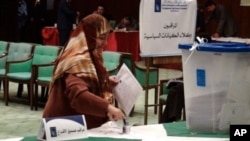Iraqis voted Sunday in national elections, despite a string of attacks across the country that left more than 38 people dead. Security is a key issue in the campaign, as whoever leads the new government will oversee the withdrawal of American troops.
Millions of Iraqi voters defied insurgents' threats to disrupt the elections and came out in force to chose a new parliament.
Iraqi military spokesman General Qassim Ata said while militants tried to scare people away, they failed.
The general said even more people turned out to vote than before. Security forces stepped up checkpoints and patrols across the country, strict curfews were enforced and borders and airports closed.
Baghdad voter Mohamad el-Bayati is one of the many voters who say security was a key issue in making his choice. "The American army will go out during this government. That makes the elections so important," he said.
Half the remaining U.S. troops in Iraq are expected to leave by the end of August, with the other 50,000 out by the end of next year. This is only the second national election since American troops led the invasion of Iraq in 2003, and the first in which Iraqi security has taken the lead.
Prime Minister Nouri al-Maliki, who is running for re-election, has lost support for not bringing violence to an end. But he continues to stress the importance of law and order, and held up the election as an example of how things are starting to get on track. The prime minister noted the presence of election monitors to help prevent any fraud. One group of international observers told VOA their initial impressions were that the vote was going well.
The election will help shape Iraq's immediate future, either allowing sectarian and ethnic divides to deepen or giving more nationalist forces a boost.
Not only is the election being seen as a test of national reconciliation, but so too is its aftermath. No party is expected to win outright, which means that whoever comes out on top will have to reach out to other parties to form a government. The hope is that it will not take too long, for fear a power vacuum could develop.
A key player in any coalition building is likely to be Kurdish parties. Like the race elsewhere in Iraq, Kurdistan's future is open for re-alignment, with a new group called "Change" challenging the two traditional Kurdish parties.
Kurdistan Prime Minister Barham Saleh stressed the need for the vote to be perceived as open. He promised the Kurdish government would do its best to ensure the security of elections, which he said he hoped would be transparent, democratic, and honest.
The fact there is no clear-cut front-runner, as is the norm in more stagnant, authoritarian states nearby, has led many voters to seize their chance to make a difference.












